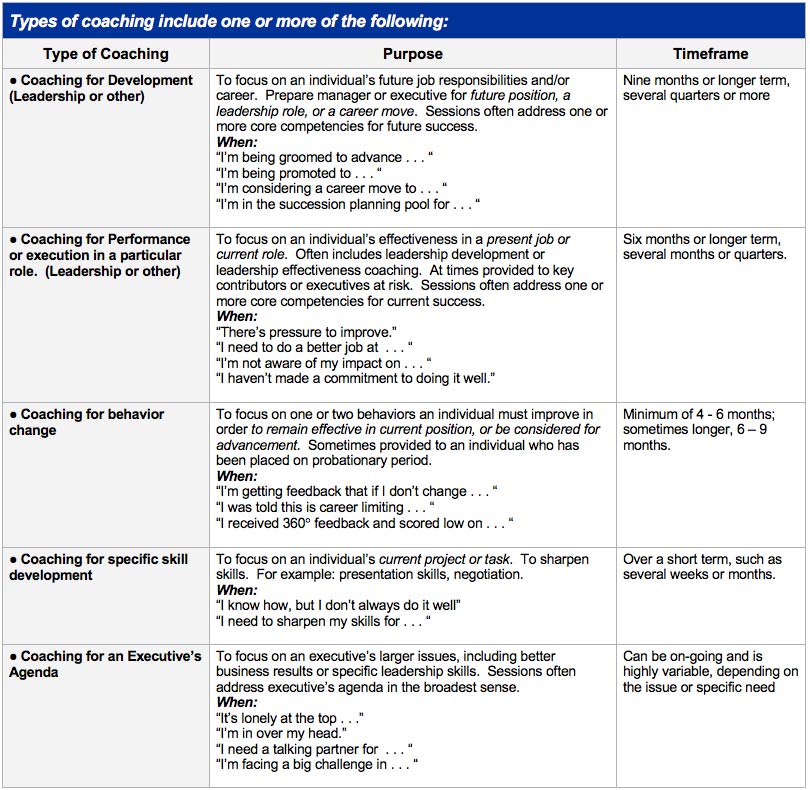Leadership coaching and Executive development
Great athletes spend a lot of time practicing and little time performing, while executives spend no time practicing and all of their time performing.
– Jim Lohr, Tony Schwartz
“The Making of a Corporate Athlete”
Harvard Business Review
Leadership Coaching and
Executive Development
Great athletes spend a lot of time practicing and little time performing, while executives spend no time practicing and all of their time performing.
– Jim Lohr, Tony Schwartz
“The Making of a Corporate Athlete”
Harvard Business Review

Our methodology for leadership coaching, management coaching, and executive coaching delivers tangible results.
Organizations that understand how essential it is to develop leadership strength engage executive coaches and management coaches to assist their top talent and those identified as high potentials to strengthen and develop core competencies that expand the organization’s capacity for growth.
Coaching can measurably enhance the performance and effectiveness of leaders and other key contributors. Coaching creates a unique and un-matched environment for positive individual growth and expansion of a leader’s capacity for adding value to the organization. The individualized yet structured process of coaching provides focused support that enables individuals to see and measure success in achieving goals.
Coaches work with clients to assist them to become more effective at accomplishing and exceeding desired outcomes. Individuals gain clarity of purpose and goals, identify appropriate adjustments in behaviors to align with those goals, and become more effective communicators to influence more purposefully and align their teams in execution By learning to ask better questions and becoming a better listener, they create more resonance in their organizations. This builds trust and enables them to hear relevant information earlier rather than later, gaining insights critical to decision-making.
While the focus is on goal achievement, the coach does not engage solely with the client’s presenting issues or competency and skill gaps. The coach works with the whole person within the context of their individual values, motivations and the organization’s values and culture.
Coaching takes place within a process that is both holistic and focused to develop strategies and real action plans for measurable, observable improvements. This often challenges the client to look at the boundary of their comfort zones, then lean forward, step into, and eventually confidently embrace new territory. At this evolution point, the client’s capability has expanded, but not solely for themselves. There is multiplicative impact for the organization as the behaviors are modeled and mentored for others.
Many leaders say they are most comfortable exploring this territory with external coaches rather than internal human resource or leadership development professionals due to the openness required to be successful in the process. It is common for individuals to achieve new levels of self-awareness and have profound insights through dialogue processes they would rarely have with an internal representative. Clients benefit from working with someone they can be completely candid with, someone who will remain objective and who they can trust to maintain complete confidentiality.
“The problem is, when you’re stuck, you’re not likely to make progress by using competence as your tool. Instead, progress requires commitment to two things. First, you need to dedicate yourself to understanding yourself better. Second, you need to change your habits of thought: how you think, what you value, how you work, how you connect with people, how you learn, what you expect from life, and how you manage frustration. Changing those habits means changing your way of being intelligent. It means moving from a non-leadership mind to a leadership mind.”
-Polloy LaBarre, Fast Company magazine, 2000

Execution through people begins with the right people in place. ‘The right people’ is usually synonymous with ‘the right talent’. Sometimes organizations have the ‘right people’ with insufficient development or expertise in a particular area, so the talent is lacking. Sometimes organizations have ‘the right talent’ in what appears to be ‘the wrong person’, referring to interpersonal skill issues.
Engaging a coach can assist organizations to align people, strategy and process.

Leadership Coaching and Executive Development
- Are there leaders in your organization that have contributed significant value in technical expertise, brought valuable industry experience and knowledge, are intelligent, dedicated, and conscientious, who’ve earned advancement to positions of leadership – and are now struggling to be as successful?
- Have they received feedback through performance reviews, talent assessments or other means and identified development opportunities related to leadership skills such as people management, communication effectiveness, relationship development . . . . and yet their awareness of the development need has not manifested in the necessary improvements in behaviors and actions?
- Is this affecting engagement with next-level employees, perhaps increasing risk of talent loss?
- Is cross-functional productivity being negatively affected?
- Do employees perceive contradiction between what leaders say and what they do?
- Has the thing most hoped would never occur (but a few knew it would), now happened with one or more of your leaders?
- Is it time for a breakthrough?
Other opportunities for coaching:
- Leading through acquisitions, mergers, restructuring and reorganization
- Leaders promoted to higher level positions with broader and more strategic responsibilities
- Leaders promoted and now leading former peers
- Leaders taking on responsibilities in unfamiliar areas
- Understanding and recovering from setbacks and apparent failures
- Professionals transitioning from project management to leadership of a direct reporting team
“There are two ways to be fooled.
One is to believe what isn’t true; the other is to refuse to believe what is true.” -Soren Kierkegaard

Coaches assist clients to:
- Identify individual core values and align actions with them
- Identify strengths and how to leverage them
- Stretch beyond their comfort zones
- Identify skill gaps and development opportunities
- Identify actionable goals
- Identify obstacles and opportunities
- Transform illusions
- Identify stakeholders the client needs to satisfy
- Hear feedback effectively
- Identity and explore issues, options, solutions
- Solve problems and make decisions
- Take risks
- Develop action plans
- Increase self-awareness about own patterns of behavior, perception, thinking
- Gain insight into assumptions and projections
- Uncover blind spots and confront resistance
- Improve leadership effectiveness
- Improve influence and negotiation skills
- Learn how to coach, develop and motivate employees
- Improve communication effectiveness
- Improve ability to have effective conversations about difficult issues, that lead to breakthrough
Who benefits from Coaching?
Everyone the client interacts with or influences: employees, teams, peers, customers, board of directors, shareholders, and their own family.
Are there different types of coaching? What if we’re not sure what we need?

What does coaching include?
Coaching engagements typically include:
- One-on-one interactive sessions in person and by phone with the coach, over a period of several months or more, at intervals as frequent as 1 – 3 times a week in the beginning, to 2 – 3 times a month later on. On-going contacts by phone and e-mail as needed to ‘check in’ and as situations arise. These sessions are completely confidential and their content is not shared by the coach with anyone else unless directed to do so by the client.
- Introductory meeting with the individual the coaching client reports to, and sometimes key stakeholders
- Administration of behavioral, skill, style or competency assessments (360◦ or other) which may include individual interviews with the client’s manager, direct reports, peers, customers and other associates.
Sample Coaching Process Overview – for Senior Leaders and Executives
Phase One: Assessment, Goal Setting and Development Planning
Duration: 2 – 6 weeks
Components may include one or all of the following:
- Meeting with CEO/Manager of coaching recipient to determine goals, needs and expectations
- Initial meeting with coaching recipient (introductory) to discuss roles clarification, needs, expectations
- Coaching sessions with coaching recipient, including creation of development plan: goal setting with identified measurements, identification of strengths development areas
- Coach reviews previous instruments such as performance reviews, talent assessments, 360° assessments, other
- Administration of behavioral, skill or competency assessments
Phase Two: Coaching, Learning and Development
Duration: 4 – 7 months
 Components include several or all of the following:
Components include several or all of the following:
- Coaching sessions targeted to goals identified in Phase One. Multiple sessions in-person and via phone.
- Receive feedback from any assessment instruments that were administered in Phase One
- Coach observes meeting(s) lead by coaching recipient (if useful and appropriate)
- Build awareness and develop skills in specific behaviors, approaches
- Learn new tools and approaches to apply awareness for behavioral change and new actions
- Follow-up meeting(s)
with CEO/Manager of coaching recipient to evaluate progress and make recommendations - Evaluate progress and modify approaches and/or scheduling according to needs and progress
Phase Three: Sustaining and Maintenance
Duration: 2 – 5 months
Components include the following:
- Coaching sessions continue at less frequent intervals, held in-person and via phone, perhaps every 3 weeks or monthly
- New behaviors are consistently demonstrated
- Closure meeting with CEO/Manager of coaching recipient to evaluate progress
- Evaluate progress and modify scheduling according to needs and progress

